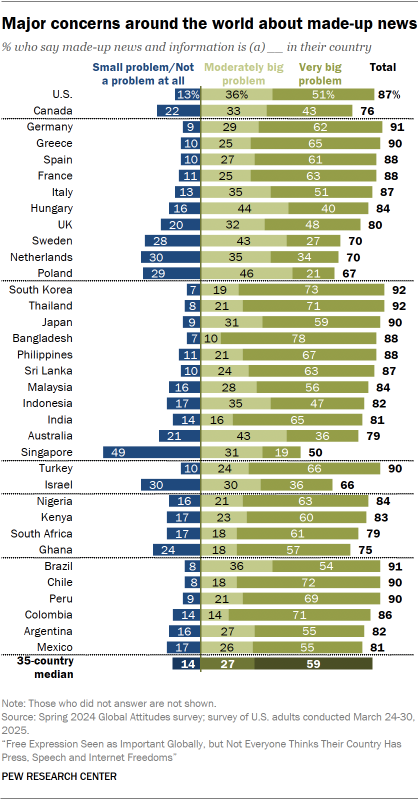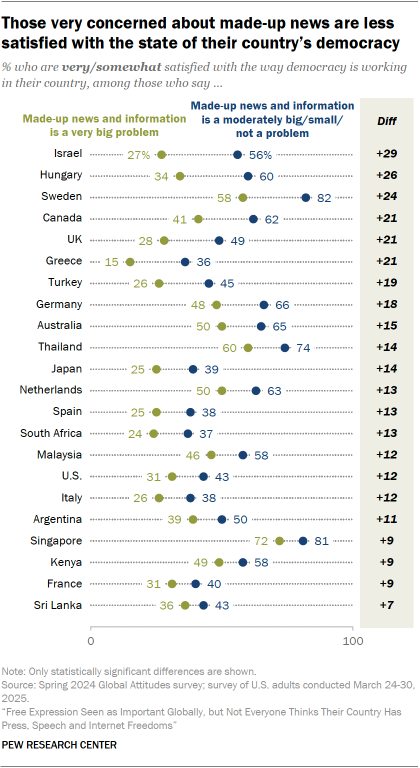Many people around the world have major concerns about made-up news and information. A median of more than eight-in-ten adults across 35 countries surveyed say it is a big problem in their country, including 59% who see it as a very big problem.

Concern about fabricated news is uniformly high across the sub-Saharan African and Latin American countries surveyed. Half or more of the public in each of these countries believes false news is a very big problem there.
In North America, 43% of Canadians and about half of Americans (51%) say made-up news is a very big problem in their country.
For a closer look at Americans’ views on made-up news and information, read our October report: “Americans’ Views of 2024 Election News.”
Similarly, roughly half of adults or more in France, Germany, Greece, Italy, Spain and the UK consider false news a very big problem. However, in the Netherlands, Poland and Sweden, only about a third or fewer agree.
Large shares in much of the Asia-Pacific region say manipulated news is a very big problem in their country, including majorities of at least seven-in-ten in Bangladesh, South Korea and Thailand.
In Singapore, only 19% say made-up news and information is a very big problem – the smallest share of all the countries surveyed. Nearly half of adults there (49%) say fabricated news is a small problem or not a problem at all.
Since 2019, a “fake news” law has enabled the government of Singapore to act against what it considers to be false information online. Singaporean opposition leaders, tech companies and rights groups alike have criticized the law, saying it gives the government too much power and significantly limits freedom of speech in the country.
About a third of Australians (36%) also say made-up news and information is a very big problem in their country. In late 2024, the Australian government considered passing a law like the one in Singapore but scrapped the plan after they were met with significant opposition.
Views by demographic group, attitudes toward free expression
Concern about false news is widespread: In most of the countries surveyed, similar shares of younger and older adults, men and women, and people of different educational backgrounds and political ideologies say made-up news and information is a very big problem.
At the same time, there are differences in most countries based on people’s attitudes toward freedom of the press, free speech and freedom on the internet. Those who say these freedoms are very important are often more likely to consider made-up news and information a very big problem in their country, compared with those who say these freedoms are somewhat, not too or not at all important.
Views of democracy by concern about made-up news and information
Satisfaction with democracy is also tied to levels of concern about fabricated news. In 22 of 35 surveyed countries, people who see made-up news and information as a very big problem are less likely to say they are very or somewhat satisfied with the way their democracy is working.

Some of the biggest differences are in Europe: About a third of Hungarians who think made-up news and information is a very big problem in their country express satisfaction with the state of Hungarian democracy (34%). In contrast, 60% of Hungarians who say this is a moderately big problem, small problem or not a problem at all are satisfied with their democracy.
Similarly, just 15% of Greeks who are very concerned about made-up news are satisfied with the way democracy is working in their country. More than twice as many of those who are less concerned (36%) say they’re satisfied with their democracy’s functioning.
But these differences are not limited to Europe. Other countries – particularly high-income nations – also show strong links between concern about made-up news and satisfaction with democracy. For instance, in both Canada and Israel, people who think made-up news is a very big problem are at least 20 percentage points more likely than those who think it’s less of a problem to be satisfied with their country’s democracy.




